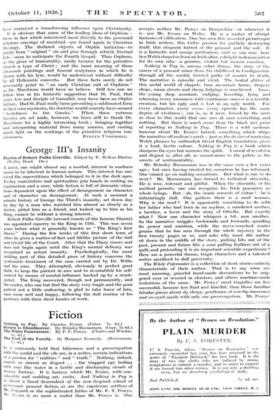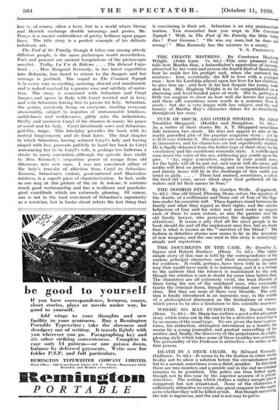Fiction
7s. 6(1.)
IT is commonly held that bitterness and a preoccupation with the sordid and the vile are, in a writer, certain indications of a passion for " realities " and "truth." Nothing, indeed, sounds as sincere as disgust . . the trapped ego boiling with rage like water in a kettle and discharging clouds of steamy fantasy. It is fantasy which Mr. Evans, with con- siderable and scalding art, emits. And Nothing to Pay is as direct a lineal deicendant of the now despised school of Picturesque peasant fiction, as are the capricious artifices of Mr. Coppard or the sophisticated fables of Mr. F. T. Powys. Mt. Evans, is no more a realist than Mr. Powys is. One accepts neither Mr. Powys on Dorsetshire —or wherever it is—nor Mr. Evans on Wales. He is a maker of abrupt fantasies of vilification. One has seen this inverted picturesque in Irish writers, this Celtic passion for publicly destroying itself, this eloquent hatred of the peasant and the soil. It is a fantastic and savage puritanism, such as one may hear in a Welsh chapel or from an Irish altar, a delight in denuneiat ion for its own sake—a genuine. violent but narrow emotion.
Nothing to Pay is, among other things, the story or the career of a peasant miser from his childhood in Cardh„nmshire through all the sordid, twisted paths of avarice to death. The narrative is episodic and -vivid. The brutal glitter of this awful world of chapels, bare mountain farms, drapery shops, mean streets and cheap lodgings is unrelieved. Amos, the young shop assistant, cadging, hoarding, lying and scheming every meanness with continuous success is a terrible creation, but his ugly soul is lost in an ugly world. For every character, every scene, every episode has the seine degree of vividness ; one is, as it were, forced by the neck so close to this world that one sees at once everything and nothing. But there is much more than the black wet print of reporting in Nothing to Pay. There is a wild sardonic humour about Mr. Evan's hatred, something which whips the narrative off realism's earth ; just as the device of rendering Welsh phrases by outlandish literal English translations gives it a loud, hectic colour. Nothing to Pay is a book which sharpens the eyes but narrows the spirit. A mood of revulsion and disgust is, after all, as monotonous to the palate as the sweets of sentimentality.
Mr. Brinsley Macnamara was in the sonic case a few years ago ; but once having created his sensation he has reformed. One cannot go on making sensations. But what is one to do next? Mr. Macnamara has turned to technical obscurity. He is wise, tolerant and pitiful. When the obscurity of his method permits, one can recognize his Irish peasantry as whole beings. But—oh, the ironic rewards of virtue ! - he is infuriatingly dull. One gathers there is a mad woman. Why is she mad ? It is apparently something to do with her father who had been in an asylum, a murdered mother, a brother, a lover and the story of Othello. But exactly what? Now one character whispers a bit, now another. So the narrative wriggles backwards and forwards, spending its power and emotion, while the nerve-wracked reader groans that he has seen through the whole mystery in the first twenty pages or so, and asks why must the author sit down in the middle of the story, picking bits out of the past, present and future like a man pulling feathers out of a quilt, and pretending it is an important scientific experiment ? Here are a powerful theme, tragic characters and a talented writer sacrificed to dull perversity.
The White Paternoster is a collection of short stories entirely characteristic of their author. That is to say some are most amusing, graceful hand-made decorations to be snig- gered over or revered in cloisters, and others machine-made imitations of the same. Mr. Powys' rural tragedies are less successful, because less fluid and fanciful, than those familiar fabular pieces about sly clergy, gentlemen of cowslip innocence and ox-eyed maids with only one preoccupation. Mr. Powys'
leer is, of course, often a bore, but in a world where Sterne and Herrick exchange double meanings and posies, Mr. Powys is a master embroiderer of pretty holiness upon pagan linen. The title story is a perfect example of his delicate indelicate art.
The Fool of the Family, though it takes one among utterly different people, is the same picturesque world nevertheless. Poet and peasant are ancient temptations of the picturesque novelist. Trilby, La Vie de Botanic . . The Beloved Vaga- bond . . . Miss Margaret Kennedy, in her latest expedition into Bohemia, has dared to return to the Sangers and her courage is justified. The sequel to The Constant Nymph is in every way as exciting, amusing, shrewd and unashamed, and is indeed marked by a greater ease and subtlety of narra- tion. The story is concerned with Sebastian and Caryl Sanger, and opens in Italy with Caryl worried and in love, and with Sebastian forcing him to pursue his lady. Sebastian, the genius, carelessly living on everyone, treating everyone abominably, subject to impulses of unreasonable kindness, caddishness and recklessness, glibly robs the industrious, thrifty and mediocre Caryl of his chances in music, his peace of mind and his lady. Caryl laboriously sows and Sebastian, god-like, reaps. This interplay provides the book with its central tragi-comedy and its final farce. The final chapter in which Sebastian, having seduced Caryl's lady and having eloped with her, proceeds publicly to hand her back to Caryl announcing her to be Caryl's wife, is perhaps too ludicrous a stroke to carry conviction, although the episode does credit to Miss Kennedy's serpentine power of escape from old dilemmas into new ones. I was not convinced either of the lady's transfer of affection from Caryl to Sebastian. Genuna, Sebastian's violent, good-natured and illusionless mistress, is a superb piece of characterisation. In fact, smile as one may at this picture of the vie de bohente, it contains much good workmanship and has a resilience and psycholo- gical exactitude which are extremely pleasing. Of course, one is not in the least convinced of Sebastian's superiority as a musician, but in books about artists the last thing that is convincing is their art. Sebastian is an airy sentimental. ization. You remember how you wept in The Constant Nymph? Well, in The Fool Of time Family the little baby dies ! Poor Gemma ! "He was my man, but he done me wrong ! " Miss Kennedy has the mixture to a nicety.
V. S. Parrausrr.









































 Previous page
Previous page